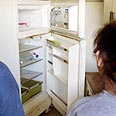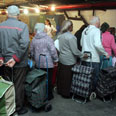

Poverty Report: 123,500 join Israel's poor
National Insurance Institute reveals 15,000 families – mostly haredi and Arab – became part of circle of poverty in 2009, almost two of five children in Israel disadvantaged. Social resilience survey reveals 28% of Israelis think their economic situation is 'very bad'
Some 123,500 people joined the circle of poverty in Israel in 2009, according to the National Insurance Institute's Poverty and Social Gaps released Monday.
A total of 850,300 children live under the poverty line, the report said, and almost two in five children are disadvantaged.
According to the data, some 15,000 families – mostly large Arab and ultra-Orthodox families – joined the circle of poverty in 2009. In total, Israel has 435,000 poor families.
The number of poor families rose from 19.9% in 2008 to 25% last year. The number of poor residents went up from 23.7% to 25%. The number of poor children rose from 34% in 2008 to 36.35% in 2009.
A geographical segmentation reveals that the number of poor residents rose to 32.3% in the northern district, and remained unchanged at 23.6% in the southern district. In the Jerusalem district, the number of poor Jewish residents dropped to 22.7%, while the number of poor Arab residents in east Jerusalem jumped to 72%. In Tel Aviv and central Israel, only 13% of residents are poor.
"The 15,000 families which joined the circle of poverty in 2009 suffered a direct blow, which affected more than 120,000 people," said Social Affairs Minister Isaac Herzog. "These families don't have any stable economic support which could have prevented their distress."
According to the minister, a drop was recorded in the number of elderly people living under the poverty line, and 9,300 managed to emerge from the circle of poverty due to the increase in old age pensions.
"The ongoing improvement in the extent of poverty among the elderly leaves no doubt as to the need to update the National Insurance Institute pensions. This report proves that updating the pensions prevented an ongoing deterioration. This is the exact goal of a social safety net," Herzog said.
'Salary doesn't see us through the month'
Meanwhile, a social resilience survey reveals that fewer Israelis believe the State will protect them and trust in the heaven's graces. In spite of violence and political corruption, most Israelis see Israel as a preferred place of residence. The results were to be presented at the Sapir College Conference on Israeli Society on Monday.
As in previous years, violence is the main concern. 81% of Israelis said that the issue of violence in society is the one issue that disturbs them more than any other, exactly like last year and more than the 73% that were disturbed by the issue in 2008.
Coming in at second place is political corruption, which went down to 72% from 80% in 2009. Third in the list of things that worry Israelis is poverty and the gap between rich and poor in Israel, 70% this year, down from 79% in 2009. The decline is most likely caused by the global economic crisis and its consequences. The Palestinian conflict was in fourth place this year – with 69% of people concerned over the issue, down from 71% last year.
In two aspects of cohesion and belonging (pride in Israel, defense and protection of the citizen and his family) there is a drop when compared to 2009's survey: Only 55% of Israelis are proud of their country as opposed to 62% last year. 50% believe the State will always protect them, down from 53% last year. 51% see the disengagement from Gaza as the main factor in their inability to be proud of their country.
Survey data to be released at the conference reveals that 28% of Israelis stated that their economic situation is very bad or that their salary barely sees them through from one month to the next. In addition, 26% of survey participants, up from 20% last year, state that their income allows them a much lower standard of living than what is considered reasonable.
In spite of all of the concerns, 69% of Israelis believe that the State of Israel in the best place for Jews to live in, a similar result to last year's poll.
Whereas in the past, the main factor considered as decisive in determining a person's economic situation was the effort a person expends, the current poll reveals that a majority - 22% believe God is the decisive factor. Additional factors, divided by internal reference points are: Education 13%, expended effort 16%, luck 8%, being born to the right family 11% and personal talent 8%.
The 2010 social resilience index was held in September. It is based on surveys taken in September 2009, November 2008, October 2007, 2006 and 2005, and is identical to previous surveys with slight exceptions in its character and composition.
- Follow Ynetnews on Facebook















